History/ES 247 Reading Guide
Environmental History
- Readings from Char Miller and Hal Rothman, eds., Out of the Woods: Essays in Environmental History (1997), xi-50. (e-reserve: Miller and Rothman, “Introduction; Part I: Ideas Matter”):
- Introduction, xi-xv
- Donald Worster, “The Ecology of Order and Chaos” (1989), 3-17
- Carolyn Merchant, “The Theoretical Structure of Ecological Revolutions” (1987), 18-27
- William Cronon, “The Trouble with Wilderness: Or, Getting Back to the Wrong Nature” (1994) 28-50
- Kent Ryden, “Environment and Imagination in New England,” Maine History 40:1 (Spring 2001): 70-75. (e-reserve)
Further reading:
- Donald Worster, et al., “A Round Table: Environmental History,” Journal of American History 76.4 (1990), 1087-1147. Notes
- Donald Worster, “Transformations of the Earth: Toward an Agroecological Perspective in History,” 1087-1106. JSTOR
- Alfred W. Crosby, “An Enthusiastic Second,” 1107-1110. JSTOR
- Richard White, “Environmental History, Ecology, and Meaning,” 1111-1116. JSTOR
- Carolyn Merchant, “Gender and Environmental History,” 1117-1121. JSTOR
- William Cronon, “Modes of Prophecy and Production: Placing Nature in History,” 1122-1131. JSTOR
- Stephen J. Pyne, “Firestick History,” 1132-1141. JSTOR
- Donald Worster, “Seeing Beyond Culture,” 1142-1147. JSTOR
The three essays, or “thought pieces,” originally published during the second decade of Environmental History Review, get at the heart of thinking historically and thinking environmentally, although they approach the task in very different ways. What does each historian posit as the necessary contribution that historians bring to Environmental Studies?
Worster’s essay outlines the twentieth-century evolution of the scientific understanding of ecology and ecosystems, and adds a historical (and human) perspective to the discussion. Are the historical and scientific perspectives compatible?
Merchant offers a theoretical model for describing and explaining the two major ecological revolutions or transformations that occurred in American history from the 1600 to 1860. To clarify her interpretation, take the evidence from her topical organization (ecology, production, reproduction, consciousness) and apply it to the different stages that she describes. What changes and what stays the same?
Cronon offers a somewhat different periodization than Merchant in his ideological analysis of the conceptions of wilderness from the seventeenth to the twentieth centuries, and he presents a sharp critique of popular environmental perspectives about the “natural world.” What does he hope to achieve by this critical reading? What does “wilderness” mean?
Kent Ryden’s 2001 comment on three recent articles on Maine environmental history begins with a series of premises that indicate the continuing analytical and interpretive significance of the arguments that Worster, Merchant, and Cronon proposed. (Indeed, had he been so inclined, he could have cited each of their earlier articles.) His review shows some of the particular ways that those issues and concerns have emerged and developed in Maine history, and offers us some guidance about what we should look for as we “think environmentally” about Maine history.
Postcards:
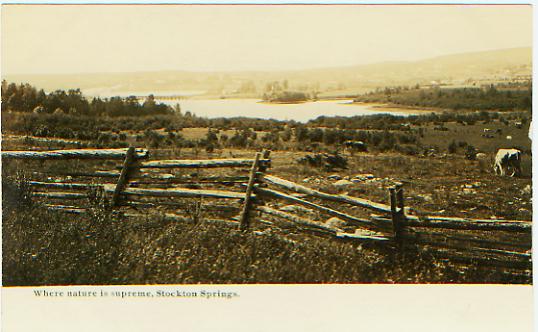
Where nature is supreme. Stockton Springs [Me.] (c.1905)
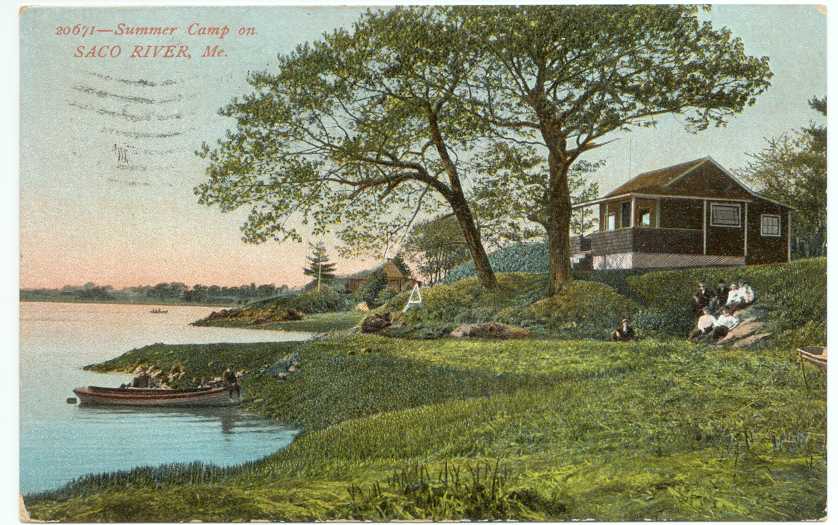
Summer Camp on Saco River, Me. (c. 1908)
- Mr. Chase, Will you come down after your things Monday for I want to get the things all out by that time. Mrs. Richards
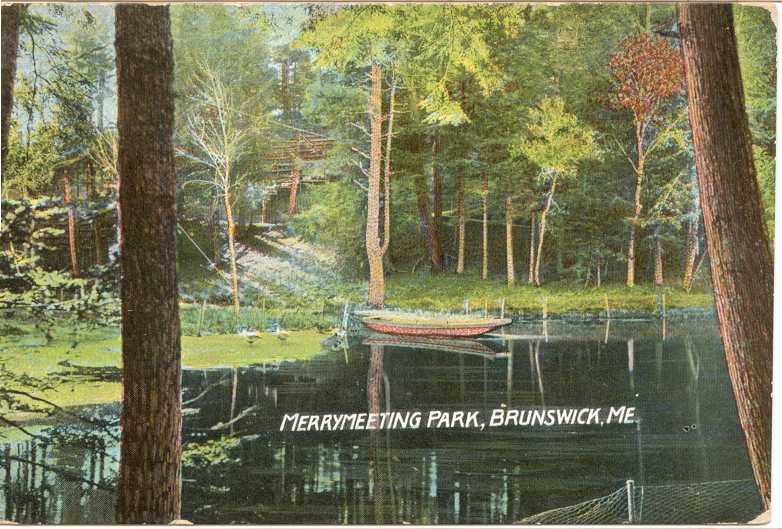
Merrymeeting Park, Brunswick, ME. (c. 1911)
- If you should ever want to write, send the letter to Miami, Ariz. and it will reach me. In haste Harry
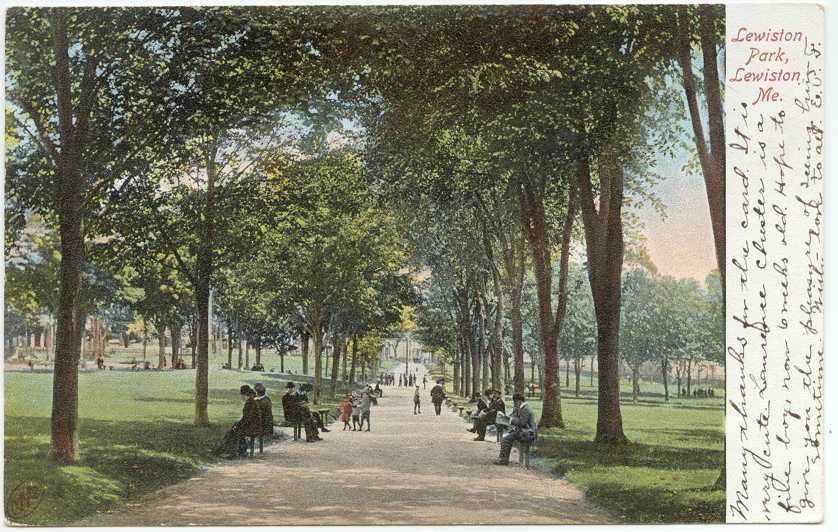
Lewiston Park, Lewiston, Me. (c. 1903)
- Many thanks for the card. It is very cute. Laurence Chester is a fine boy, now 6 weeks old. Hope to give you the pleasure of seeing him sometime. With love to all. E.C.F.
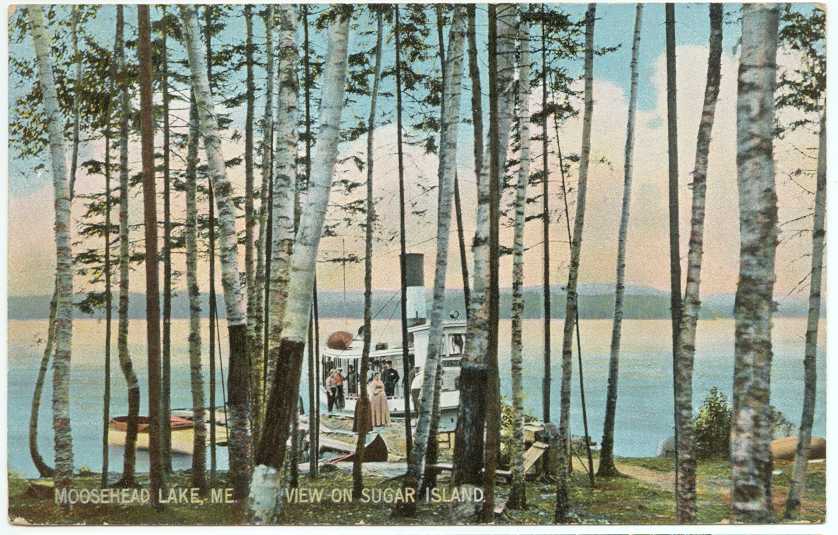
Moosehead Lake, Me. View on Sugar Island. (c. 1909)
- Dear Mother We are all well. am cleaning house. Have decided the children wont go down this vacation X'mas will soon be here. Have sold the hay and have it all loaded or 2 cars loaded and 4 ton left. Harold Brooks is working here now, are getting along fine. Lovingly Linnette
Expect D— up Sat. P.M. wish you could come too.
